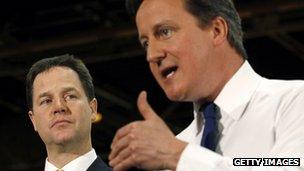Queen's Speech: What it means - and what's been left out
- Published

The PM and his deputy face a tricky balancing act on Lords reform
This was David Cameron's second Queen's Speech as prime minister, and Her Majesty's 57th.
As usual, there was the pomp and ceremony. Tourists lining the streets trying to grab a photo of the Queen. Members of the Household Cavalry lining the Norman Staircase in Parliament. The Crown itself being transported around parliament on various cushions, before being put on by Her Majesty. This is the arcane imagery that will be on the television bulletins this evening.
But arguably a more useful political image for today is this: What we are getting is what the former Labour cabinet minister Lord Mandelson once called "a washing line" of plans. It has just over a dozen pegs on it, setting out the government's legislative laundry it wants to sort before the next general election.
Expect plenty of headlines and discussion about proposed changes to the House of Lords, which would mean most of its members would be elected as opposed to appointed. But it is pretty clear from the Queen's second sentence that ministers want to be seen to focusing on the economy, and growth - or the current lack of it.
"My ministers' first priority will be to reduce the deficit and restore economic stability," Her Majesty said.
The House of Lords Reform Bill promises that "most members of the House of Lords would be elected by the people".
'Vague' plans
Ministers argue that it is important to bring what they call "democratic legitimacy" to the House of Lords and substantially cut the number of members. They point out that with over 800 peers at the moment, the Lords is one of the largest legislative chambers in the world.
Under the plans set out today, elected members of the Lords would be voted in using a proportional electoral system, for non renewable 15 year terms, representing regions bigger than House of Commons constituencies.

Ministers will want to emphasise the government's family-friendly policies
But it is striking that the language appears very general, or, as Conservatives sources would have it, "vague".
The background briefing on the bill does not include a timetable for making it happen. Liberal Democrat sources insist though there has been no watering down of the commitment to shake up the Lords.
It is a tricky balancing act for both the prime minister and deputy prime minister.
David Cameron has no shortage of his own backbenchers claiming that most ordinary people find discussion of constitutional reform boring and irrelevant at the best of times, and these are far from the best of times.
'Parental leave'
But for the Liberal Democrats, having already lost the referendum a year ago on shaking up the voting system for elections to the Commons, securing a legacy of permanent constitutional change is important.
In total, there are 15 bills in this Queen's Speech, and four draft bills. This is fewer than in many recent addresses.
Expect ministers touring the TV and radio studios today to talk up the Children's and Families Bill.
A central idea within it is it will give "parents access to flexible parental leave". We are told this would allow mothers and fathers to share responsibilities "in a way which bests fits their needs".
What is being referred to here is maternity leave.
The idea is that this could be shared between mum and dad, for example allowing a better-paid mother to return to work while the less well paid father takes time off. But what doesn't appear in the Queen's Speech, having proved controversial within the coalition, is the right for parents to request flexible working, such as fewer hours and job sharing, throughout their working lives.
Left out?
Other plans, that have already caused the government some grief, have made it into Her Majesty's address. Take the Draft Communications Data Bill. You may remember the headlines from a few weeks ago about plans to increase monitoring of emails and web usage. Her Majesty said the government would bring forward measures "to maintain the ability of law enforcement and intelligence agencies to access vital communications data under strict safeguards".
The briefing we have seen emphasises "communications data" is information about communication, not the communication itself.
And after all those negative headlines after the Budget about increasing the taxes on charitable donations from the super rich, there is a Small Donations Bill.
The plan is to provide a top up payment similar to Gift Aid to charities that receive small cash donations of £20 or less, enabling them to claim 25p for every £1 collected in the UK, on up to £5,000 of small donations.
Finally, what isn't in the Queen's Speech?
What doesn't make the washing line of plans for new laws? There is no bill to enshrine in law the government's commitment to give 0.7% of national income in overseas aid. The government expects to meet this target by next year, but without mandating itself to do it every year.
And nothing too on marriage, whether heterosexual or homosexual. Like Lords reform, this is an issue some increasingly vociferous Conservative backbenchers see as a distraction from getting the economy going again.
The process of analysing the contents of the government's washing line of proposals is only just starting. Expect plenty more to come.
- Published9 May 2012
- Published8 May 2012
- Published7 May 2012
- Published6 May 2012
- Published22 April 2012